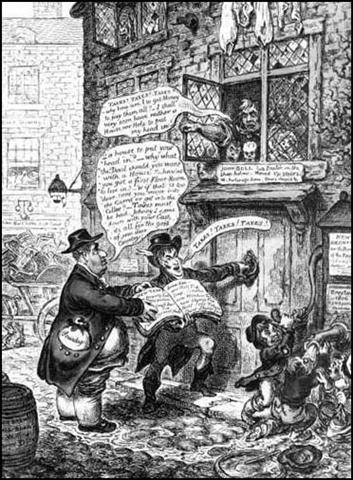Charles Fox (1749-1806 AD)
Charles Fox, the son of the Henry Fox, a leading politician in the House of Commons, was born on 24th January, 1749. After being educated at Eton and Oxford University, Fox was elected to represent Midhurst in the House of Commons when he was only nineteen.At the age of twenty-one, Fox was appointed by Frederick North, the prime minister, as the Junior Lord of the Admiralty. In December 1772 Fox became Lord of the Treasury but was dismissed by in February 1774 after criticizing the influential artist and journalist, Henry Woodfall.
Out of office, Charles Fox opposed North's policy towards America. He denounced the taxation of the Americans without their consent. When war broke out Fox called for a negotiated peace.
After 1780 Fox became a supporter of parliamentary reform. He advocated the disfranchisement of rotten and pocket boroughs and the redistribution of these seats to the fast growing industrial towns. When Lord Frederick North's government fell in March 1782, Fox became Foreign Secretary in Rockingham's Whig government. Fox left the government in July 1782, on the death of the Marquis of Rockingham as he was unwilling to serve under the new prime minister, Lord Sherburne. Sherburne appointed the twenty-three year old William Pitt as his Chancellor of the Exchequer. Pitt had been a close political friend of Fox and after this the two men became bitter enemies.
When the French Revolution broke out in 1789 Charles Fox was initially enthusiastic describing it as the "greatest event that has happened in the history of the world". He expected the creation of a liberal, constitutional monarchy and was horrified when King Louis XVI was executed. When war broke out between Britain and France in February 1793, Fox criticized the government and called for a negotiated end to the dispute. Although Fox's views were supported by the Radicals, many people regarded him as defeatist and unpatriotic.
Fox disapproved of the ideas of Tom Paine and criticized Rights of Man, however, he consistently opposed measures that attempted to curtail traditional freedoms. He attacked plans to suspend habeas corpus in May 1794 and denounced the trials of Thomas Muir, Thomas Hardy, John Thelwall and John Horne Tooke. Fox also promoted Catholic Emancipation and opposed the slave trade. Fox continued to support parliamentary reform but he rejected the idea of universal suffrage and instead argued for the vote to be given to all male householders.

James Gillray produced The Friend of the People in
1806. It shows Charles Fox (left) and Henry Petty, the
Chancellor of the Exchequer, collecting extra taxes.
When Lord Grenville became prime minister in 1806 he appointed Charles Fox as his Foreign Secretary. Fox began negotiating with the French but was unable to bring an end to the war. After making a passionate speech in favor of the Abolition of the Slave Trade bill in the House of Commons on 10th June 1806, Fox was taken ill. His health deteriorated rapidly and he died three months later on 13th September 1806.